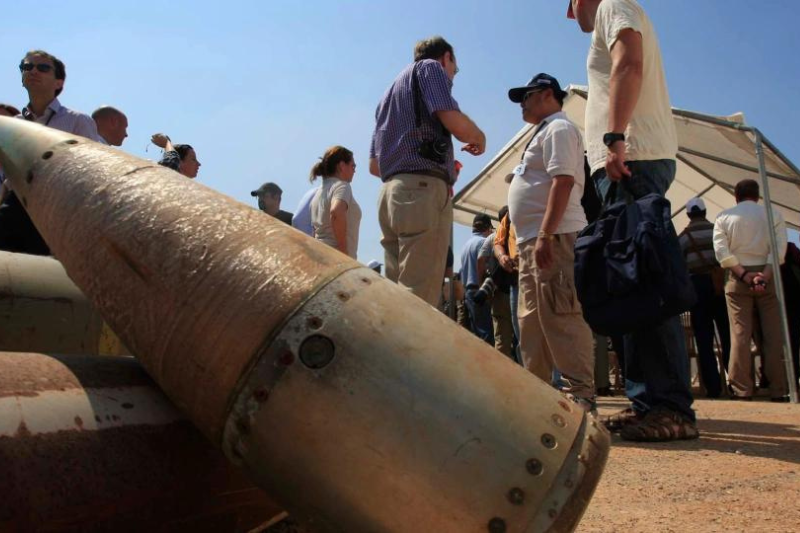

the dangers of transferring cluster munitions to ukraine a reckless move
Concerns have been raised regarding the recent decision by President Joe Biden to deploy cluster bombs in Ukraine and about breaking with a well-accepted international standard. Around 120 nations have banned cluster munitions because of the severe risk they pose to civilian populations. Cluster munitions distribute multiple submunitions across a large area. In addition to underlining the risks posed by cluster munitions, this article also evaluates the arguments offered by U.S. government authorities.
Cluster munitions are infamous for killing civilians during attacks and years after conflicts. Each submunition fired by these weapons explodes into metal shavings that can potentially kill or seriously injure people. Cluster munitions are indiscriminate, which makes it impossible for them to distinguish between military and civilians during an attack, resulting in civilian casualties. In addition, many submunitions do not detonate upon impact, creating a long-term threat to the surrounding populace, much like landmines.
Officials from the U.S. administration have made many arguments to support the transfer of cluster munitions to Ukraine. They contend that cleaning unexploded munitions in Ukraine is already a significant issue, that technology and targeting safeguards would lower dangers, and that Ukraine needs more weapons to fight Russian forces. These reasons, however, ignore the risks of using such weapons and fail to consider the lessons learnt from using cluster munitions in the past.
Unexploded submunitions threaten people, especially young children who might mistake them for toys. Conflict zones have documented kids playing with cluster munitions and getting seriously hurt or killed. In addition, cluster munitions’ contamination can obstruct cleanup efforts, putting demining personnel in danger and extending the danger to civilians.
U.S. officials say Ukrainian cluster munitions are safer since their dud rates are lower than Russian cluster munitions. Nevertheless, historical data has demonstrated that technology fixes and test results can be deceptive. Previous assertions that certain submunitions had low dud rates were false when used in combat. Further raising concerns about potential harm to civilians is that Ukraine’s assurances on using cluster munitions are circumscribed and weaker than previous directives issued by the US to other recipients.
The claim that cluster munitions are required as a stopgap measure until substitute artillery ammunition is available is reminiscent of earlier failures to foresee needs and inadequate substitutes. Cluster munitions might be helpful for military purposes against specific targets; however, they are frequently utilized in areas with civilian populations. Cluster munitions cause predictable and permanent harm to civilians.
Transferring cluster munitions to Ukraine contradicts international efforts to alleviate the harm these weapons cause. Numerous countries worldwide have endorsed the Convention on Cluster Munitions, which completely outlaws their creation, stockpiling, transfer, and use. The U.S. risks undermining this development and prolonging the humanitarian effects of these weapons by transferring cluster munitions.
Many nations have denounced the use of cluster munitions and the U.S. transfer, particularly those severely impacted by them. States parties must uphold their responsibilities under the Convention on Cluster Munitions and refrain from aiding the United States in this transfer. The use of cluster munitions must be vehemently opposed by the international community, especially the United Nations and civil society organizations. It is essential that the United States, Ukraine, and Russia put a priority on protecting civilians by forgoing the use and export of cluster munitions.
The deployment of cluster munitions to Ukraine by President Biden is quite alarming. In addition to aggravating the humanitarian issue, it goes against a widely accepted international standard. The arguments advanced by U.S. authorities ignore the serious risks that these weapons represent to allied forces and civilians and the lessons learned from earlier uses of cluster munitions. To protect civilians and avoid repeating past mistakes, the international community must act decisively, denouncing the use of cluster munitions and pushing towards their ultimate prohibition.
The DAX market is projected to begin the day without significant movements on Thursday, March 20, 2025. The markets of…
February’s employment data from Australia revealed surprising weakness with employment decreasing by 52,800, after a trend of strength. In terms…
All in all, the impacts of artificial intelligence and automation on job security have raised wide-spread concerns and discussions. With…
According to Angelique Renkhoff-Mücke the business landscape in the United States became less attractive for foreign investors when former President…
During the 2025 Game Developer Conference in San Francisco, the United Videogame Workers Union officially launched on Wednesday as a…
Google has agreed to pay $28 million to settle a class-action lawsuit that accused the tech behemoth of sending better…
This website uses cookies.
Read More